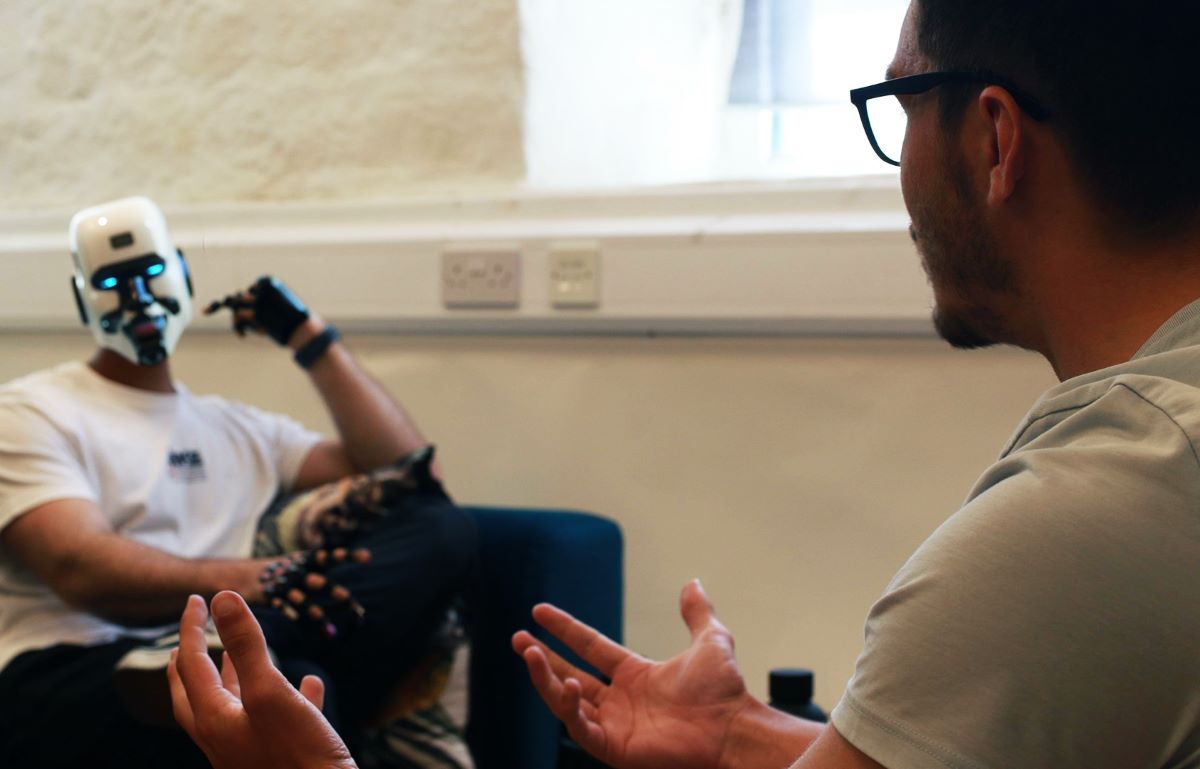
Photo: Rob Marshall
The sceptic’s guide to AI (or tangling with Roko’s basilisk)
AI is here, and we have to deal with it, says Lauren James. But rather than diving straight in, she advises first giving proper thought to its pros and cons.
Being anti-AI isn’t a position anyone can afford to take anymore, not least at the risk of incurring the wrath of Roko’s basilisk. To ensure AI is used responsibly and effectively, without harming the arts, even the biggest sceptics need to engage with it rather than covering their ears and screaming.
But similarly, a blanket acceptance of AI without grappling with what it means isn’t the way forward either. So, here are my words of caution to anyone looking to AI to solve issues with creativity or resourcing. I’m not saying you shouldn’t use it, I’m just saying that anyone who does should be aware of what they’re engaging with.
Why I’m sceptical about AI
There are three main reasons I’m not totally convinced AI should be allowed to run roughshod through the creative industries.
1. As a writer
The most self-indulgent reason, sure, but it’s important. I’m a copywriter, journalist trained, with over a decade and a half’s experience of using words as a craft. Just like a designer or developer, these are skills developed over time.
Using AI and saying you’ve achieved the same result honestly cheapens that craft. And in truth, it isn’t yet capable of the same quality. Eight-fingered hands and bizarre grammar structures aside, AI-derived writing lacks the human element – the context and understanding – that makes work good and worthwhile.
2. As a creative industry professional
I work in a digital agency doing a creative role. My biggest joy is when I’m able to give someone their first paid job as a writer. That opportunity changed my life when it came my way, and it’s a privilege to do the same.
As AI is more often used, we begin to see it as a tool to take care of the more boring, tedious and repetitive tasks, which is great. But these are typically the tasks given to people starting out in their careers such as writing SEO category copy, or designing multiple programmatic ad variations.
It’s how we hone our skills and come to understand the industry. Relying on AI removes the need for those roles, and thus removes the early career opportunities.
3. As a worker in solidarity with others
No beating around the bush: AI exists on stolen labour. To create work, it needs to be fed endless content to learn from. Most of that content is scraped from the internet which the original creators didn’t consent to. Nothing I have seen to date has convinced me otherwise.
Unless there’s an attempt to slow down and understand AI’s use, I’m concerned about end results that remove job opportunities and lead to lower wages, as creative jobs are replaced with AI training and prompt-writing positions.
We shouldn’t rush to AI to solve everything
If you’ve read my gripes and still think AI is worthwhile, I don’t blame you. Honestly. I know how much expectation is placed on digital, creative and marketing people’s shoulders. I know how much time AI can save, and how it makes certain things far more accessible from a cost and skills perspective. So I can’t fault people who rely on it. But I believe it shouldn’t be relied on for long-term solutions for one simple reason: It lets funders off the hook.
The arts are often starved of funding, and we have to fight for it. Any excuse to cut funding is usually taken, typically in ways that impact the organisations and communities that need it the most. And if AI means that all of a sudden, we need less budget for recruitment, training, outsourcing creative, and all the other things it could easily replace, we probably won’t get it anymore.
So, how should we use AI?
Carefully
Do research on the platforms you use and find out where their datasets come from. There are generative AI models out there, for example, that apparently do compensate the artists and writers that power it.
All AI-derived work needs thoroughly checking. There are common visual and language quirks that are increasingly recognised as markers of AI-generated content. Putting out raw AI content is a recipe for disaster.
Frequently reviewed
If you’re using AI, don’t view it as a permanent solution, or an excuse not to, say, recruit when you’re able to. Make sure you’re aware of your usage and ensure you don’t become more reliant on it than you need to be.
With awareness of what it means
I think this is the most important part. All I can reasonably ask is, if you are going to delve into the murky world of AI, you stop and think about it first. That before you make any decisions, you weigh up the pros and cons and consider what it means if you make it part of your strategy. That’s all.
Lauren James is Head of Content and Web Projects at Splitpixel.
![]() https://www.splitpixel.co.uk/
https://www.splitpixel.co.uk/
![]() @splitpixel
@splitpixel
This article is part of a series contributed by Splitpixel to share expertise on how to best apply accessibility and inclusivity principles in digital spaces.
Join the Discussion
You must be logged in to post a comment.